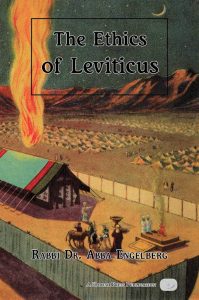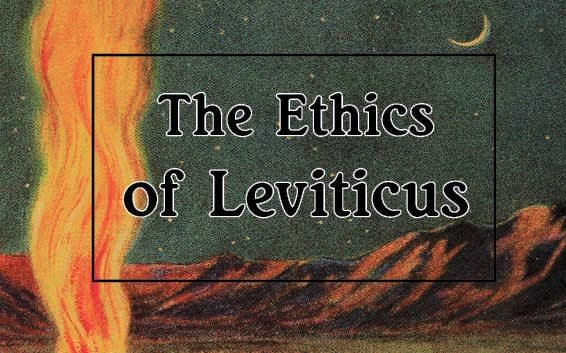 The Ethics of Leviticus
The Ethics of Leviticus
Rabbi Dr. Abba Engelberg
Kodesh Press
“A book on Leviticus?” I hear you ask. “Why is he reviewing a book on Leviticus in August? We don’t read Leviticus until the spring!”
First off, Torah is – or should be – evergreen. As an editor, I encourage writers to say, “In Exodus 23, we read…” or “It says in parshas VaYishlach…” rather than “In this week’s parsha…,” which unnecessarily locks a piece into a particular time frame. Similarly, we should allow ourselves to learn lessons from Rus even when it’s not Shavuos and from Yonah even when it’s not Yom Kippur.
When it comes to Sefer VaYikra – the Book of Leviticus – the tendency to avoid is perhaps exacerbated because many people are intimidated by it even in its proper time frame in the seder haparshiyos. The name Leviticus comes from the rabbinic title of the book, Toras Kohanim. These names translate as “the laws of the priests/Levites,” reflecting the fact that much – though not all – of this sefer revolves around the Temple service. To many, the laws of sacrifices and ritual impurity seem irrelevant. We no longer offer sacrifices, which have been succeeded by prayer, and we do not observe most forms of tumah and tahara, so we don’t understand these things and we don’t see the need to.
The first problem with such reservations is that the Book of Leviticus contains much more than just korbanos and various forms of tumah. Among the other topics in Sefer VaYikra, you’ll find the laws of sexual propriety (chapter 18), Shabbos and holidays (chapter 23), shemittah and yoveil (chapter 25) and the first tochacha, God’s rebuke to us should we fail to obey His Torah (chapter 26). While there’s precious little narrative in this particular book, we do have the incident in which two of Aharon’s sons perished (chapter 10). And how can we overlook Leviticus 19:18, “you shall love your neighbor as yourself?”
The second problem with people’s reticence is the assumption that we have no practical use for studying korbanos and tumah v’tahara. And that’s where The Ethics of Leviticus begins. As the author states later, in his commentary on shemittah, the more clearly moralistic laws “serve as a reminder that many of the seemingly arbitrary laws have ethical facets and ramifications.”
Rabbi Dr. Abba Engelberg is a graduate of the Telshe Yeshiva and a RIETS musmach. Additionally, he has a PhD from NYU and has served as a chaplain with the rank of colonel in the US Air Force. He also has four decades’ experience as a professor in the Jerusalem College of Technology. In this work, he examines the ethical implications of the mitzvos and narrative in Sefer VaYikra. (This book is the third in a series, the earlier installments – which I have not seen – focusing on Genesis and Exodus.)
The Ethics of Leviticus hits the ground running by discussing the rationale underlying korbanos as posited by the Rambam. After a thorough introduction to these concepts through the Rambam’s lens, Engelberg then contrasts them with the very-different approach of the Ramban, as well as outlining the historical consequences that resulted from this difference of opinion.
What was the sin of Nadav and Avihu, and did they deserve to die for it? What exactly is ritual impurity and what do we learn from it? What does it mean to be holy and how can we strive to achieve such a lofty goal? These are just some of the questions addressed in this volume.
Engelberg doesn’t just pose a question and then answer it with the position of one mefaresh. Rather, he presents multiple perspectives from both historical and modern authorities, resulting in a well-rounded examination of each subject. For example, the discussion of the concepts underlying tumah invoke not only the position of the Rambam (a 12th-century Rishon) but also the thoughts of Rav Hirsch (19th-century Germany) and Rav Soloveitchik (20th-century US). A discussion of the chronology of the tochacha in Bechukosai and its relation to the tochacha in Ki Savo starts in the Midrash then weaves its way through the ibn Ezra, Ramban and Abarbanel.
Aside from the thoughtful analyses of topics arranged by sedra, The Ethics of Leviticus includes a number of useful appendices on subjects ranging from the varying opinions regarding the timeline of the two Temples to the Queen Heleni of Adiabene and her son, King Munbaz.
As per its name, much of Leviticus revolves around laws that are unique to kohanim and Leviim. In his opening pages, Engelberg, citing Rav Dovid Zvi Hoffman (19th-20th century Germany), reminds us that “these rituals obviously pertain to the entire nation” as a kohein is “no more than the emissary of the common man for performing the Temple service.” We are each enjoined to be holy and, in fact, “a nation of priests” (Exodus 19:6), with the result that Leviticus is truly meant for us all.
The Ethics of Leviticus will enhance one’s appreciation for a sefer of Chumash that is perhaps undervalued, or at the very least approached by many with some degree of trepidation. Read it chapter-by-chapter over the course of ten weeks in the spring to illuminate your review of the weekly Torah portion or enjoy it at any time of year because Torah-study is always good.
Rabbi Jack Abramowitz is Torah Content Editor at the Orthodox Union. He is the author of six books, including The Tzniyus Book and The Taryag Companion. His latest work, The God Book, is available from OU Press as well as on Amazon.
The words of this author reflect his/her own opinions and do not necessarily represent the official position of the Orthodox Union.
